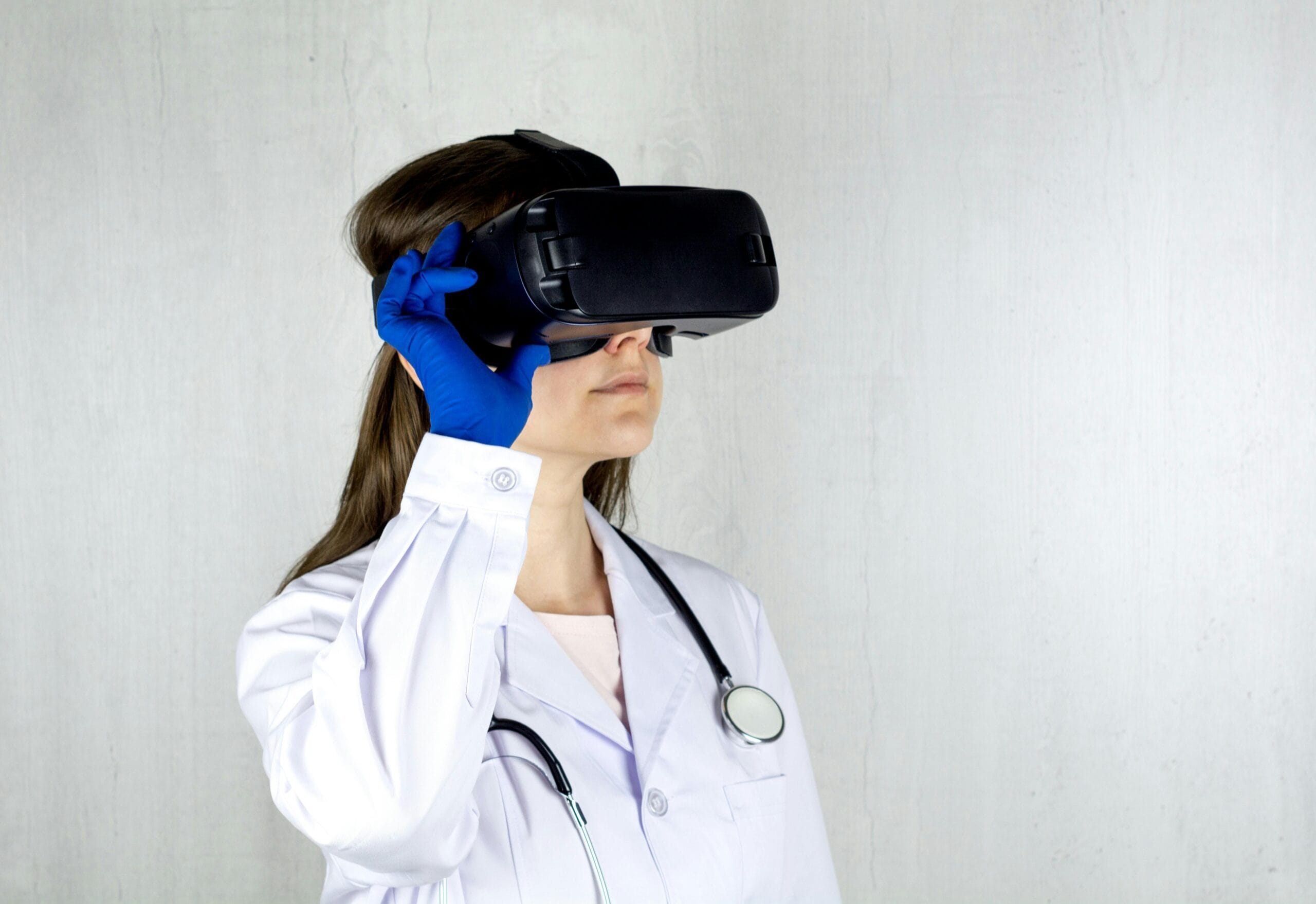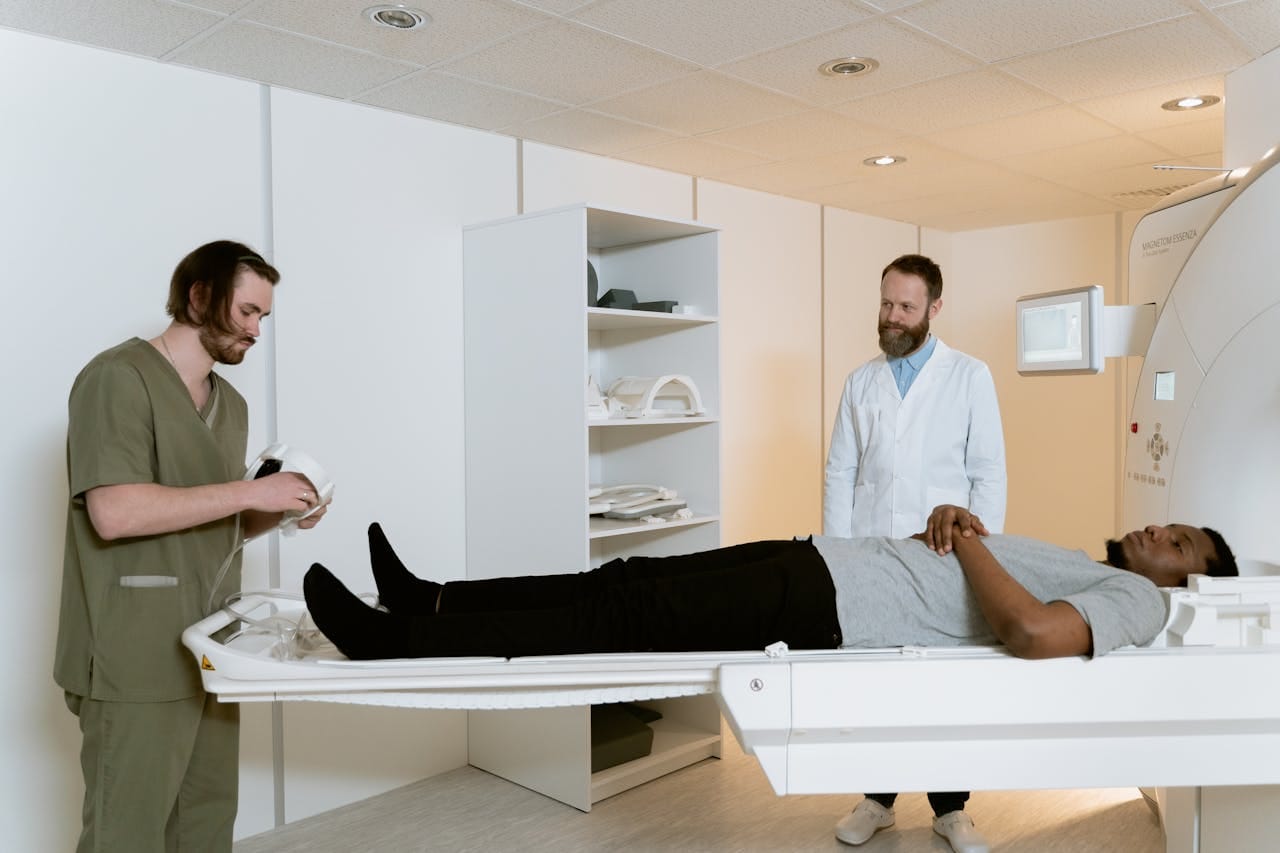
Artificial intelligence has often been depicted as villainous robots ready to take over the world. But I’m here to tell you that AI can actually save lives and improve health care for millions of patients around the world. AI is helping us personalize the delivery of care, make hospitals more efficient, and improve access to health care by providing accurate decision-making tools.
Today in this blog post we will discuss Introduction of Ai in Healthcare and who are the leading providers of ai technology in health care .
What is AI in Healthcare

AI is the process of educating a computer model using complex and large data sets. The model learns from this data in a training process to build its ability to make decisions or predict outcomes when presented with new data.
We are talking about having access to a computer model that knows, based on the experience of thousands of other patients, whether a treatment is likely to work and what works best for that patient based on their individual conditions.
AI models are helping doctors learn from patients with similar conditions or even similar genetic information and make highly informed decisions about their diagnosis and their treatment options.
In healthcare, AI’s role is to analyze complex medical data, support clinical decision-making, and improve patient care. Whether it’s detecting early signs of disease or personalizing treatment plans, AI is increasingly becoming a critical tool in the healthcare professional’s toolkit.
Also read – 10 Best Ai courses for Software engineers
Key AI Technologies in Healthcare
Several AI technologies are transforming healthcare. Let’s break down some of the key ones:
- Machine Learning and Deep Learning: These AI methods help process large volumes of medical data, such as images, patient records, and genetic information. Machine learning algorithms can identify patterns and make predictions based on these datasets, supporting physicians in decision-making.
- Natural Language Processing (NLP): NLP allows computers to understand, interpret, and generate human language. In healthcare, NLP is used to analyze unstructured clinical notes, patient records, and even doctor-patient conversations, improving patient care coordination and documentation.
- Computer Vision: AI-driven computer vision is revolutionizing medical imaging, such as MRI scans, CT scans, and X-rays. It enables faster, more accurate detection of conditions like cancer, fractures, or neurological disorders.
- Robotics: AI-powered robots are being used in surgery, rehabilitation, and patient care. Surgical robots, like the da Vinci Surgical System, offer enhanced precision, resulting in minimally invasive procedures and faster recovery times.
4 Ways Ai is Transforming Healthcare
1. Patient Care

Patients Misdiagnosis of diseases is a common issue, often due to factors such as physician fatigue, errors in diagnostic methods, or limited resources.
AI can be a supportive tool for physicians by using convolutional neural networks (CNNs) to analyze images from public data sets and patient medical records to identify patterns, enabling quick and accurate diagnosis.
CNNs have been used to diagnose Kawasaki disease, an inflammatory blood vessel disease in children that can be fatal if left untreated. However, clinical judgment remains essential, and physicians should still rely on a thorough history, physical exam, and relevant labs or imaging.
AI can also aid in diagnosing various diseases, such as colorectal cancer, lung cancer, and liver cirrhosis. In one study, AI slightly outperformed pathologists in diagnosing colorectal cancer with 98% accuracy. However, biases can exist in data sets, which can influence the way AI interprets the diagnosis.
AI can also aid in treatment, particularly in personalized medicine, which uses genetic information to prevent, diagnose, or treat diseases.
For example, Mayo Clinic developed a machine learning algorithm to predict patient response to methotrexate, a crucial arthritis drug.
Researchers at Georgia Institute of Technology and Ovarian Cancer Institute used machine learning algorithms to determine treatment effectiveness for certain chemotherapies in ovarian cancer patients.
AI has also potential in predicting the occurrence and progression of chronic diseases like hypertension, diabetes, and kidney disease, helping patients live longer, healthier lives. Predictive models are being developed to estimate a patient’s current glucose level based on factors such as previous glucose levels, body mass index, external stress, and sleep.
Early diagnosis and treatment of diabetes can prevent complications like diabetic kidney disease and blindness, which are emotionally distressing and costly for both patients and the healthcare system.
2. Research

AI in healthcare is revolutionizing medical research, particularly in clinical trials, by identifying eligible patients and streamlining the process of developing new treatments. AI has proven effective in discovering potential drugs, but the discovery process can be time-consuming and resource-intensive.
Verge Genomics was one of the first companies to discover a potential drug for Amyotrophic lateral sclerosis (ALS) using AI instead of animal or cell testing. This allowed for more accurate representations of effective treatments in humans, avoiding drug failure in translation.
AI writing tools, such as ChatGPT, can significantly reduce the time needed to prepare and revise manuscripts. While ChatGPT has been used in scientific research and has been credited as a co-author on multiple papers, it has limitations, including the possibility of referencing incorrect data and creating fake citations. Other software, such as Consensus, can guide initial literature reviews and provide summaries for papers that answer research questions.
While AI writing tools can help brainstorm ideas and collect and synthesize data, they should not replace academic writing. While AI can be useful for brainstorming ideas and collecting data, it is not yet expected to replace traditional academic writing. In conclusion, AI is transforming the way medical research is conducted, particularly in clinical trials.
3. Administrative Tasks
Third Way AI is improving medicine by streamlining administrative tasks in healthcare. For example, BotMD is a company with an AI service that assists patients with clinical issues like finding physicians on call, scheduling appointments, or answering prescription-related questions such as the availability of certain medications or their Alternatives.
Allowing AI to take over these tasks can free administrative staff to focus on other obligations. AI can also simplify medical scribing since physicians don’t have to take their own notes or employ medical scribes as opposed to human scribes who are subject to human error.
AI works instantly and immediately understands medical terminology. AI technology can pre-authorize insurance and optimize billing for physicians since billing is reliant on accurate, consistent documentation. Reducing the burden of these tasks can help prevent physician burnout, a significant problem that leads to psychological distress for doctors and worse outcomes for patients.
Also read – 7 Best AI Tools for Writing Legal Documents
4. Medical Education

Lastly, AI is quickly being integrated into medical education at all levels of training. For example, Oscar, an Australian medical education company, allows medical students to practice their history-taking skills on AI patients using this tool.
Students can learn to ask the proper questions and consider various diagnoses for any specific presentation. Integrating AI more thoroughly into formal medical curricula can prepare future physicians for AI’s increasing role in healthcare.
Some universities, like Duke and Stanford, have already introduced courses to help medical students and residents learn to use AI to solve healthcare issues. The Mayo Clinic and Stanford offer courses that teach physicians how AI is currently influencing medicine as well as how they can use it to their advantage in their practice.
AI has huge potential to revolutionize many different facets of medicine, but with any change we should be cognizant of any drawbacks or possible biases.
Top 8 Ai health care Tools
Top 10 AI Tools for Healthcare: Transforming the Future of Medical Technology
1. AI-Powered Diagnosis Assistant
- Utilizes machine learning algorithms to analyze patient symptoms, medical history, and test results in real time.
- Acts as a trusted partner augmenting medical expertise and reducing diagnostic errors.
- Provides evidence-based recommendations and treatment options instantly.
2. Virtual Nursing Assistants
- Integrates into healthcare environments providing invaluable support to nursing professionals.
- Empowers nurses to allocate more time to direct patient engagement and tailor care plans.
3. Robotic Surgery Systems
- Revolutionizes surgical procedures with enhanced precision and dexterity.
- Allows surgeons to perform complex procedures with enhanced precision and depth.
4. Predictive Analytics for Patient Monitoring
- Offers unparalleled insights and forecasts in real time for proactive intervention.
- Detects subtle early signs of deterioration and identifies individuals at high risk.
- Predicts Adverse Events, empowering Medical Teams to make informed decisions and administer timely intervention.
5. AI-Enabled Drug Discovery
- Expedits the drug development process by leveraging AI algorithms to analyze vast amounts of biomedical data.
- Enables researchers to uncover novel treatments and accelerate clinical trials.
6. Intelligent Electronic Health Records
- Utilizes AI to automate data entry, improve interoperability, and facilitate advanced analytics.
- Enhances healthcare efficiency and empowers Healthcare Providers to make informed decisions.
7. Virtual Health Assistance
- Provides remote medical support and guidance using advanced algorithms and data analysis.
- Prioritizes privacy and confidentiality while delivering accurate and timely information.
8. AI-Based Radiology
- Uses deep learning algorithms to detect abnormalities in medical images with remarkable accuracy.
9. Smart Wearable Devices
- Integrates into daily lives providing a wide range of functionalities.
- Monitor health and fitness goals with precision.
10. AI Driven Precision Medicine
- Analyzes vast amounts of patient data including genetics, medical history, lifestyle factors, and treatment outcomes.
Also read – How To Learn Ai 2024- 25 ? Best Road map to start over.
leading providers of ai technology in health care

1. IBM Watson Health
- Overview: IBM Watson Health is one of the most prominent players in AI in healthcare. Their AI-powered platform is designed to assist healthcare professionals in making data-driven decisions.
- Applications: Watson Health focuses on areas such as oncology, genomics, drug discovery, and personalized medicine. It is well-known for its work in cancer treatment, where Watson assists oncologists by analyzing vast amounts of medical literature and patient data to suggest treatment options.
2. Google Health (DeepMind)
- Overview: Google Health, particularly through its subsidiary DeepMind, has been a major player in applying AI in healthcare. DeepMind’s AI systems are designed to solve complex problems in medical imaging and diagnostics.
- Applications: DeepMind has developed AI models for diagnosing eye diseases, predicting patient deterioration in hospitals, and analyzing medical images. They’ve partnered with healthcare providers to improve the speed and accuracy of diagnosing conditions like diabetic retinopathy and age-related macular degeneration.
3. Microsoft Healthcare
- Overview: Microsoft is integrating AI technologies into healthcare through its Azure cloud platform and AI solutions like Microsoft Cloud for Healthcare.
- Applications: Their AI offerings include predictive analytics for patient outcomes, AI-driven health bots for customer service, and solutions for improving clinical workflows. Microsoft also works on initiatives related to improving patient engagement, streamlining hospital operations, and enhancing health data analysis.
4. Amazon Web Services (AWS)
- Overview: AWS is increasingly focusing on AI solutions for healthcare, helping healthcare organizations utilize cloud technology and machine learning to improve care delivery.
- Applications: AWS offers a variety of AI services, such as Amazon Comprehend Medical (for extracting medical information from texts), Amazon Transcribe Medical (for transcribing doctor-patient conversations), and AI-powered tools for predictive analytics and medical imaging.
5. Siemens Healthineers
- Overview: Siemens Healthineers is a leader in medical technology and AI solutions, focusing on diagnostics, imaging, and laboratory management.
- Applications: They provide AI-based medical imaging solutions, such as AI-powered tools for radiology that help detect abnormalities and make diagnoses more accurate. Their AI algorithms also help with personalized treatment planning in radiotherapy.
6. GE Healthcare
- Overview: GE Healthcare has been at the forefront of AI in medical imaging and diagnostic solutions. Their AI-powered technologies aim to streamline healthcare operations and improve clinical outcomes.
- Applications: GE Healthcare uses AI in medical imaging solutions to automate image analysis and enhance diagnostic accuracy. Their tools help in detecting conditions like cancer, heart disease, and neurological disorders.
7. Philips Healthcare
- Overview: Philips is a key player of Ai in healthcare technology, with a focus on AI to improve patient outcomes and healthcare delivery.
- Applications: Philips offers AI-driven diagnostic imaging solutions and patient monitoring systems. Their AI-enabled tools assist in early disease detection, personalized patient care, and remote patient monitoring, particularly in the fields of cardiology and oncology.
8. Tempus
- Overview: Tempus is a technology company focused on using AI and machine learning to analyze clinical and molecular data to help doctors make personalized treatment decisions.
- Applications: Specializing in oncology, Tempus applies AI to analyze genetic data, medical records, and clinical trial data. It helps oncologists identify the most effective treatments for patients based on genetic profiles.
9. Zebra Medical Vision
- Overview: Zebra Medical Vision is an AI company that focuses on medical imaging and diagnostics, offering a wide range of tools for healthcare professionals.
- Applications: Their AI algorithms analyze medical imaging data to detect a variety of conditions such as cardiovascular diseases, cancers, and neurological disorders. Zebra’s AI solutions aim to enhance diagnostic accuracy and speed.
10. Babylon Health
- Overview: Babylon Health is a health technology company that leverages AI to provide virtual consultations and healthcare services.
- Applications: Babylon Health uses AI-driven chatbots to provide healthcare advice and offer symptom checks. Their platform also includes AI-driven tools for personal health tracking, providing users with insights into their overall health and well-being.
The Benefits of AI in Healthcare
AI’s integration into healthcare brings a multitude of benefits:
- Improved Accuracy and Speed: AI enhances diagnostic accuracy, reducing the likelihood of human error. Machine learning models can analyze medical data at incredible speeds, providing results faster than traditional methods and enabling quicker treatment decisions.
- Cost Reduction: AI reduces operational costs by streamlining workflows, minimizing errors, and optimizing resource allocation. In the long term, it can lower the cost of treatments and medications, making healthcare more affordable for both providers and patients.
- Better Patient Outcomes: AI-powered tools enable more accurate diagnoses, timely interventions, and personalized treatment plans, leading to better outcomes for patients. Predictive analytics can also help prevent adverse events by identifying risk factors early.
- Increased Access to Care: AI has the potential to bridge healthcare gaps in underserved areas. Through telemedicine, remote monitoring, and AI-driven diagnostic tools, patients in rural or low-resource settings can receive quality care without the need for extensive travel.
The Future of AI in Healthcare
As AI continues to evolve, its impact on healthcare will only grow:
1. A Collaborative Human-AI Approach
The future of healthcare is not about replacing human doctors with AI but about creating a collaborative environment. AI can assist healthcare professionals by handling routine tasks, analyzing large datasets, and providing decision support, allowing doctors to focus on patient care.
2. Continuous Learning and Adaptation:
AI models can continually learn and adapt as new data becomes available. This ability to evolve ensures that AI will remain at the cutting edge, improving over time and driving further innovations in healthcare.
3. Global Impact:
AI has the potential to revolutionize healthcare worldwide, especially in developing countries where access to trained healthcare professionals is limited. AI-powered tools can help diagnose diseases, manage chronic conditions, and improve public health systems globally.
Conclusion
AI is set to play a pivotal role in the evolution of healthcare, offering unprecedented opportunities for improving patient outcomes, enhancing operational efficiency, and transforming the way we deliver and receive medical care. However, as with any technological advancement, its adoption must be carefully managed to address ethical, privacy, and regulatory concerns. By embracing the potential of AI while mitigating its risks, healthcare can be ushered into a new era of innovation, where patients benefit from more personalized, efficient, and effective care.
